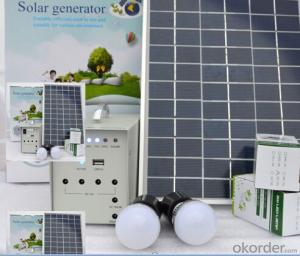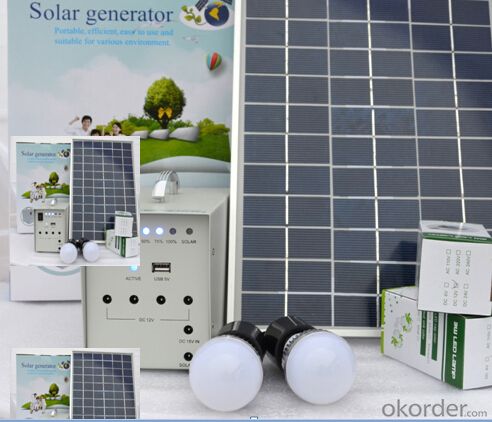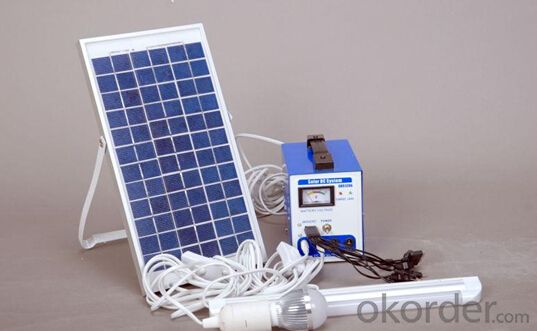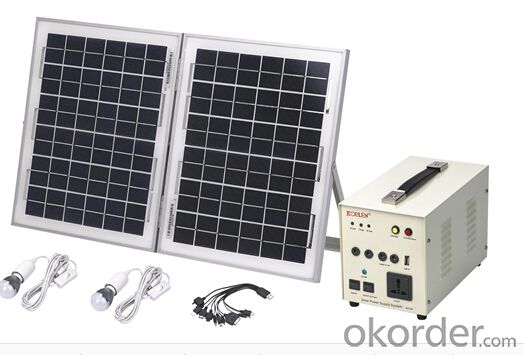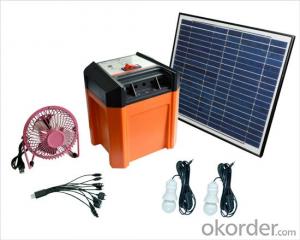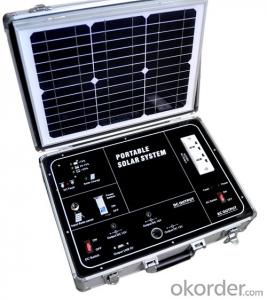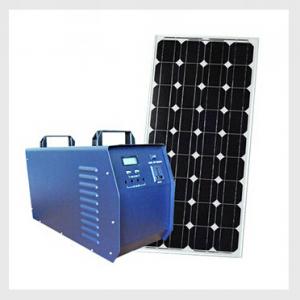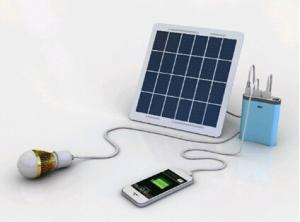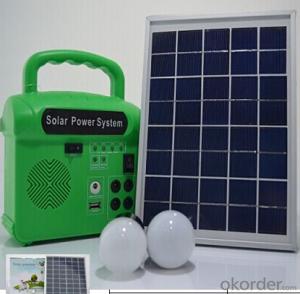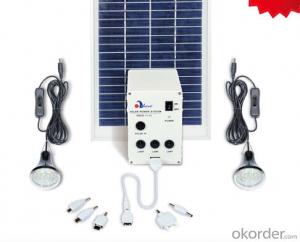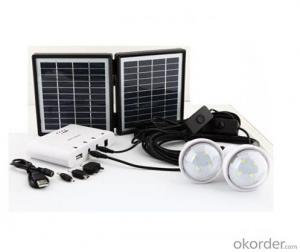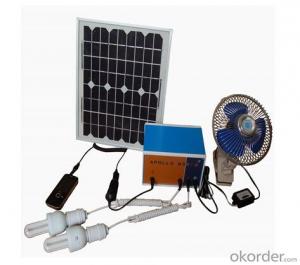CNBM Solar Home System Roof System Capacity-5w - Solar Energy Systems Coimbatore
- Loading Port:
- Shanghai
- Payment Terms:
- TT or LC
- Min Order Qty:
- 5 unit
- Supply Capability:
- 500000 unit/month
OKorder Service Pledge
OKorder Financial Service
You Might Also Like
Introduction of Solar Home System
Solar Home System is composed by Solar Panels, Inverters, Charger Controller, Battery, Cable, Mounting Bracket, which is applied to produce electricity for home use.
Solar Home System is quite suitable product in urban area and the place which is short of electricity. Our Small Solar Home System own great benifits compare with other kind electricity resources:
Electricity generating cost of Solar Home System is much cheaper than diesel engine. Beside low electricity making cost, solar system products also have the features of noiseless, clean energy, environmentally friendly and can access to many different electric appliance.
Working Principle of Solar Home System
The stand alone Solar Home System is an off-grid solar system which uses batteries to store the solar energy. Stand alone solar system solutions design for those who are not able or willing to connect to electricity grid.
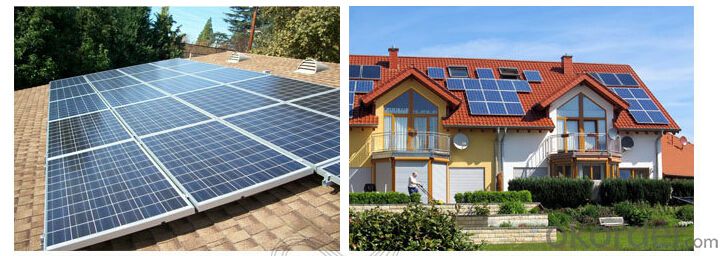


Specification of Solar Home System
Names of Modules | Parameters | Package Specification |
Poly-crystalline Silicon Solar Panel | 18V/5W 245*185*18MM | Package:1 set/box
Encasement:4 sets/ctn
Color Box Size:230*163*310MM Carton Size:475*335*330MM
NW3.04kg/
GW:3.55 kg/set |
Lead Acid Battery | 12V/4AH | |
Controler | 12V/3A | |
Control Box Size | 115*95*148MM | |
LED Light | 3W/6V/12V 2pcs | |
Light Wire | M/24# | |
Solar Panel Line | M/24# | |
Output | 5V/12V |
Advantage of Our Solar Home System
1 Excellent Performance: Our Solar Home System is composed by Brand Standard Kits with high quality. Our solar system has the advantage of high efficiency and stable operation. We can ensure our product with a long life period.
2. Small Orders Accepted: We can accept small orders as our customer’s trial order.
3. Warehouse: We have warehouse overseas which can bring great convenience to our customer to pick up the products.
Terms and Conditions
1. Trade terms: FOB Shanghai
2. Payment terms: 30% T/T, balanced before shipment/ LC at sight before shipment. Actual Terms can be negotiated for big order.
3. Package: Exported standard package suitable for tough handling and sea transport.
4. Delivery: Goods to be ready within 10~30 days depending on order quantity.
5. Warranty: 10 years for solar panel, 2 years for controller/inverter/battery.
FAQ
Q: Could you introduce the background of your company?
A: We are a Group corp. with 1GW capacity in China, which is Okorder’s registered VIP Supplier, possess Financial Service from Okorder.com.
Q: Required mainly certificates (CE&IEC/TUV/RoHS)?
A: Our products are certificated by CE RoHS, IEC, ISO, TUV, UL etc.
Q: Your main exported market is?
A: Main markets of our products is: South-east Asia, Mid-east, Arica, East Europe and Latin America.
- Q: Can solar energy systems be used in areas with limited access to solar grounding equipment?
- Yes, solar energy systems can still be used in areas with limited access to solar grounding equipment. While proper grounding is important for safety reasons, it is not always mandatory for the installation and operation of solar panels. Alternative grounding methods, such as using ground-mount racks or ballast systems, can be employed in such areas. Additionally, off-grid solar systems with batteries can provide power even without grid connection or grounding requirements. However, it is crucial to consult with experts and adhere to local regulations to ensure safe and efficient operation of the solar energy system.
- Q: Can a solar energy system be installed on a museum or cultural institution?
- Yes, a solar energy system can be installed on a museum or cultural institution. Solar panels can be mounted on the roof or in an open space surrounding the building to harness sunlight and convert it into electricity. This can help the institution reduce its reliance on conventional energy sources, lower its carbon footprint, and potentially save on electricity costs in the long run. Additionally, the installation of solar panels can also serve as an educational display, highlighting the institution's commitment to sustainability and renewable energy.
- Q: Can solar energy systems be used in areas with strict building codes or homeowner association restrictions?
- Yes, solar energy systems can be used in areas with strict building codes or homeowner association restrictions. However, it may require careful planning and adherence to specific guidelines. In such cases, homeowners or developers would need to work closely with relevant authorities to ensure compliance with regulations while incorporating solar energy systems into the building design.
- Q: Are there any fire safety concerns associated with solar energy systems?
- Solar energy systems have been found to have fire safety concerns. Although they are generally considered safe and reliable, there have been instances where these systems have caused fires. One concern regarding fire safety is associated with the improper installation or maintenance of solar panels. If the panels are not installed correctly, there is a possibility of electrical faults or short circuits, which can lead to overheating and potentially result in fires. Similarly, if the system is not regularly inspected and maintained, it can increase the likelihood of electrical failures and subsequent fires. Another concern is related to the electrical wiring and connections of the solar energy system. Faulty wiring or loose connections can generate heat and potentially cause electrical fires. This is particularly relevant in older systems where the wiring may have deteriorated over time. Furthermore, firefighters may encounter additional challenges when dealing with buildings equipped with solar energy systems during a fire incident. The presence of live electricity generated by the panels can pose a risk to firefighters, making it more difficult to safely extinguish the fire. To address these fire safety concerns, it is crucial to have qualified professionals install solar energy systems in accordance with the necessary codes and regulations. Regular inspections and maintenance should also be carried out to promptly identify and resolve any potential issues. Additionally, proper training should be provided to firefighters on how to handle fires involving solar energy systems in order to minimize risks.
- Q: Can a solar energy system be financed through a loan?
- A loan can be used to finance a solar energy system. Numerous financial institutions provide loans specifically for renewable energy projects, such as solar energy systems. These loans are intended to assist individuals and businesses in covering the initial expenses of purchasing and installing solar panels and associated equipment. In certain instances, these loans may be secured by the solar energy system itself, permitting the lender to assume ownership if the borrower fails to repay the loan. The terms and conditions of these loans will vary based on the lender, but they generally offer competitive interest rates and flexible repayment choices. Furthermore, there might be several government incentives and tax credits accessible to further reduce the cost of financing a solar energy system. All in all, financing a solar energy system through a loan can be a feasible and financially beneficial choice for those interested in investing in renewable energy.
- Q: What is the role of solar energy systems in disaster resilience?
- Solar energy systems play a crucial role in disaster resilience by providing a reliable and sustainable source of electricity during emergencies. These systems can power critical infrastructure such as hospitals, emergency shelters, and communication networks, ensuring that essential services remain operational even when the grid is down. Solar energy also reduces dependence on fossil fuels, making disaster-affected areas more self-sufficient and less vulnerable to fuel shortages. Additionally, solar panels are durable and require minimal maintenance, making them ideal for disaster-prone regions. Overall, solar energy systems enhance the resilience and preparedness of communities in the face of natural disasters.
- Q: Can solar energy systems be used in disaster-prone areas?
- Certainly, solar energy systems have the potential to be utilized in areas prone to disasters. In reality, they can prove particularly advantageous in such regions. Conventional power grids often prove to be fragile and susceptible to damage during natural calamities such as hurricanes, earthquakes, or floods. Consequently, these events can result in prolonged periods without electricity, hindering relief and recovery efforts. On the other hand, solar energy systems are decentralized and can operate independently from the grid. These systems consist of solar panels that convert sunlight into electricity, which can then be stored in batteries for use during power outages. This enables critical facilities, including hospitals, emergency response centers, and shelters, to function even when the grid is not operational. Solar energy systems can provide a reliable source of power for lighting, communication, refrigeration, and medical equipment, significantly enhancing the resilience and efficacy of disaster response. Moreover, solar energy systems can also be employed to power water pumps, ensuring that communities have access to clean water during crises. This is particularly crucial in disaster-prone areas where access to safe drinking water can be severely compromised. Solar-powered pumps can extract water from wells, rivers, or other sources, ensuring a consistent supply for drinking, sanitation, and hygiene purposes. Additionally, solar energy systems can contribute to long-term recovery efforts in disaster-prone areas. By reducing reliance on fossil fuels and conventional power grids, they can aid in the creation of sustainable and resilient communities. Solar panels can be installed on rooftops or in open spaces, utilizing the abundance of sunlight resources. This not only reduces greenhouse gas emissions and mitigates climate change but also provides a dependable and cost-effective source of energy for homes, businesses, and public infrastructure. In conclusion, solar energy systems can effectively serve disaster-prone areas by providing dependable power, supporting critical services, and promoting long-term resilience. By harnessing the power of the sun, these systems offer a sustainable and decentralized solution to energy needs, ensuring that communities can withstand and recover from natural disasters more effectively.
- Q: Can solar energy systems be used in areas with limited sunlight hours?
- Solar energy systems can indeed be utilized in regions with minimal sunlight hours. Although solar panels generate the highest amount of energy when directly exposed to sunlight, advancements in technology have made it feasible for solar systems to still produce electricity even in areas with limited sunlight. One method to tackle the issue of limited sunlight hours is by installing solar panels that are more efficient at capturing and converting sunlight into electricity. These high-efficiency solar panels can optimize energy production even in areas with reduced sunlight. Additionally, the utilization of tracking systems that tilt and follow the sun's path throughout the day can also aid in increasing energy output. Another approach involves storing excess energy generated during peak sunlight hours in batteries. This stored energy can then be utilized during periods of low sunlight, enabling the solar system to continue powering homes or businesses even in the absence of sunlight. Furthermore, integrating solar power with other renewable energy sources, such as wind or hydroelectric power, can help compensate for limited sunlight hours. By combining different sources, a more reliable and consistent energy supply can be achieved. In conclusion, although limited sunlight may impact the energy production of solar systems, there are numerous technological solutions and strategies that can be employed to make solar energy feasible even in areas with fewer sunlight hours.
- Q: Can a solar energy system be installed on a building with multiple levels?
- Yes, a solar energy system can be installed on a building with multiple levels. The installation of a solar energy system depends on various factors such as the available space, orientation, and structural integrity of the building. In multi-level buildings, solar panels can be installed on the roof, balconies, or other suitable areas that receive adequate sunlight. Depending on the design and layout of the building, it may be necessary to install multiple solar arrays on different levels to maximize energy generation. Additionally, it is important to ensure that the building's electrical infrastructure can support the installation of a solar energy system. Overall, with proper planning and consideration of the building's characteristics, a solar energy system can be successfully installed on a building with multiple levels.
- Q: How much energy can a solar energy system produce?
- The amount of energy a solar energy system can produce depends on various factors such as the size of the system, the location, the amount of sunlight received, and the efficiency of the panels. On average, a solar energy system can generate enough electricity to meet a significant portion of a household's energy needs, and in some cases, even produce surplus energy that can be fed back into the grid.
Send your message to us
CNBM Solar Home System Roof System Capacity-5w - Solar Energy Systems Coimbatore
- Loading Port:
- Shanghai
- Payment Terms:
- TT or LC
- Min Order Qty:
- 5 unit
- Supply Capability:
- 500000 unit/month
OKorder Service Pledge
OKorder Financial Service
Similar products
Hot products
Hot Searches
Related keywords
